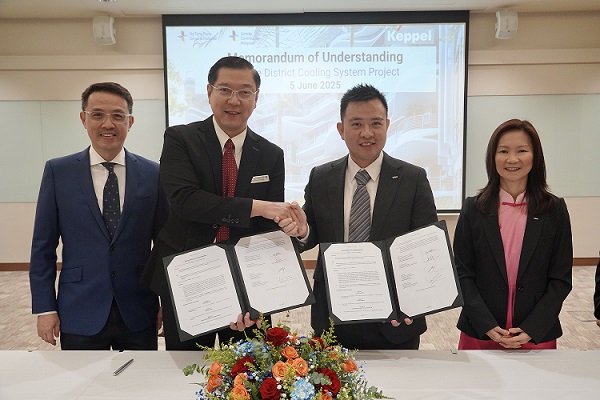
SINGAPORE — The Ng Teng Fong General Hospital (NTFGH) and Jurong Community Hospital (JCH) have entered into a Memorandum of Understanding (MOU) with Keppel Ltd.’s Infrastructure Division (Keppel) to explore the feasibility of Keppel expanding its upcoming District Cooling System (DCS) plant in Jurong Lake District further for NTFGH and JCH’s use.
Under the MOU, the exploratory study will include the DCS plant’s supply and service coverage of chilled water for the two hospitals. If the project proceeds with a service level agreement between the two sides, the twinned hospitals will be integrated with Keppel’s upcoming state-of-the-art large scale 29,000 Refrigerant Tons (RT) DCS plant – a first in Singapore's healthcare sector.
The DCS will be able to complement and further optimise the existing energy efficiency measures at NTFGH and JCH, a Green Mark Platinum-certified hospital campus, with potentially substantial energy efficiency compared to conventional buildings, and potentially result in financial savings and the reduction of carbon footprint.
Currently, these two hospitals rely primarily on a centralised chilled water supply to meet the complex, round-the-clock cooling demands of a healthcare facility that includes uninterrupted cooling for operating theatres, intensive care units and medical equipment. Standby chillers and energy storage solutions are also in place to protect against cooling interruptions, which are critical for 24-hour healthcare operations.
The DCS uses technologies such as thermal energy storage and intelligent controls to optimise energy use. They are designed to deliver reliable and consistent cooling temperature, thereby improving patient comfort and care, and reducing the risk of downtime and disruption to hospital operations.
Said Associate Professor Dan Yock Young, Chief Executive Officer, NTFGH and JCH, “We are continually looking at initatives to align with Singapore’s national sustainability effort; and doing our part to create a sustainable environment for patients and the community, while empowering staff as environmental stewards. The DCS could further optimise existing energy efficiency measures at our hopitals and reduce the need to replace and maintain chillers. This could in turn, free up some of the hospital's rooftop and plant room space, which are occupied by cooling towers and standby chillers, for other meaningful activities such as patient care and therapy.”
Added Mr Ng Kian Swan, Chief Sustainability Officer, NTFGH and JCH, and Chief Operating Officer, Group Facilities Management, Group Security & Group Emergency Planning, NUHS, “This MOU is a leap forward as we explore ways to save the planet; reap savings from electricity, water and maintenance costs; and reduce our carbon footprint. Guided by the exploratory study, the collaboration could set a new benchmark in the healthcare sector, and an important milestone in NUHS’ sustainability journey where the first DCS is implemented on a brownfield site.”
Ms Cindy Lim, Chief Executive Officer, Keppel’s Infrastructure Division, said, “Keppel is delighted to partner NTFGH and JCH on the exploratory study and value-add to their sustainability journey. Advanced cooling for large-scale developments and mission critical sectors requires strong engineering and operating capabilities. By exploring the integration of NTFGH and JCH into Keppel’s new district cooling plant in the Jurong Lake District, we can help the hospital campus to reduce its energy intensity as well as to enhance the availability and operational resilience and long-term reliability of the interconnected cooling infrastructure.”
The abovementioned developments are not expected to have any material impact on the net tangible asset per share or earnings per share of Keppel for the current financial year.
To download the PDF version of the media release, click here.


















